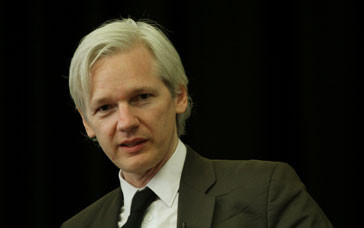The Guardian, October 2, 2010
UK defence chiefs silent on Afghan civilian deaths revealed by WikiLeaks
Freedom of information request into 21 incidents where UK forces shot Afghan civilians rejected by MoD officials
By Rob Evans and David Leigh
The Ministry of Defence yesterday refused to disclose any details of its investigations into the shooting of innocent civilians by troops in Afghanistan. This follows the disclosure in the Guardian of the existence of 21 separate such cases which have apparently been covered up.

WikiLeaks' founder, Julian Assange, whose website revealed military documents detailing UK forces' attacks on Afghan civilians. (Photo: Graeme Robertson)
The cases emerged following the publication by WikiLeaks, the whistleblowing website, of thousands of classified US military field reports. These included accounts of units of the Coldstream Guards and Royal Marines firing on civilians.
In one case, on 21 October 2007, US soldiers in Kabul reported that a gunner on top of an unidentified UK vehicle wounded three civilian interpreters in a private security company vehicle. The notes stated: "Investigation is controlled by the British. We are not able to get the complete story."
On another occasion, on 12 March 2008, British troops in Helmand province called in an airstrike, which resulted in the deaths of two women and two children, and injured another child.
MoD officials responded to a freedom of information request by the Guardian yesterday by admitting that they possessed information on the civilian casualties, but claimed it would involve too much work to search their electronic archive.
An anonymous official at the British military headquarters, Northwood, rejected the FOI request on the grounds that "we would need to undertake … separate searches, one for each incident you have detailed, of our electronic archive system, each of which will take up to five days".
The founder of WikiLeaks, Julian Assange, appeared in London last night to deny that his global band of activists was in trouble, following reports of resignations and splits.
Assange denied that WikiLeaks' representative in Germany was suspended for criticising him.
Daniel Berg, who says he has now resigned from the project, told German news magazine Der Spiegel that Assange had unilaterally taken the decision to suspend him and had "reacted to the smallest criticism by accusing me of being disobedient and disloyal".
But Assange dismissed this as "absolute lies". "He was suspended a month ago for other reasons," said the site's founder, without giving details.
Assange, a 39-year-old Australian, shot to global prominence earlier this year when the website obtained 90,000 leaked US military files detailing operations in Afghanistan, and made them available to the Guardian, along with the New York Times and Der Spiegel.
Since then, Assange, a former hacker, has had a bumpy ride. The Pentagon claimed WikiLeaks could not guarantee Afghan informants' safety from reprisals.
On Thursday at London's City University, Assange told an audience at an event by press freedom group Index on Censorship that there was no evidence anyone had actually suffered any reprisals, and that the site had edited out large numbers of names in order to prevent such a development.
He was unwilling to be drawn on the details of sexual assault claims, which still leave him facing possible prosecution in Stockholm. Details were leaked, apparently by Swedish police, of a complaint following consensual sexual encounters two women had with him on successive nights.
Characters Count: 4020
